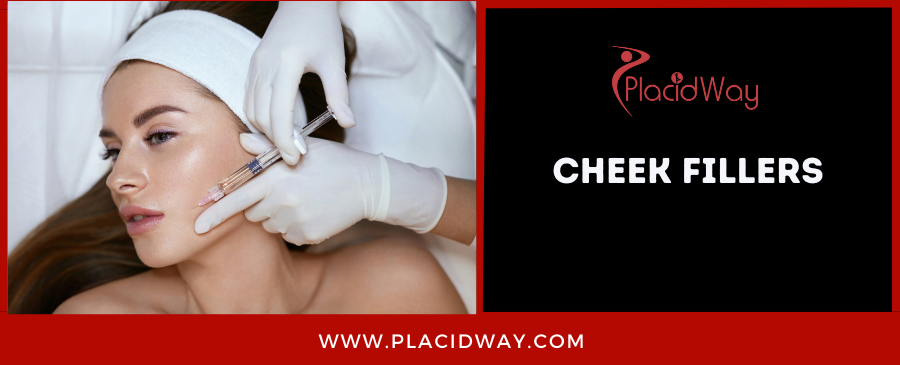
Reclaim Youthful Contours: Your Guide to Cheek Fillers Abroad
Are you looking in the mirror and noticing your cheeks aren't as full or defined as they once were? Perhaps you’re seeing more shadows under your eyes, or your cheekbones seem to have lost their prominent arch, making your face look tired or gaunt. Many people search for "how to get fuller cheeks" or "how to restore volume to face" to address these common signs of aging.
Cheek fillers offer a powerful, non-surgical solution to rejuvenate your mid-face, bringing back that youthful plumpness and natural lift. This popular cosmetic procedure involves injecting a safe, biocompatible substance into the cheek area to add volume, smooth lines, and enhance facial contours. Whether you’re noticing "sagging cheeks," "hollow cheeks," or just want to "define cheekbones" more, dermal fillers can make a significant difference.
Globally, people are increasingly considering medical tourism for cosmetic enhancements like cheek fillers. The appeal lies in the potential for significant cost savings without compromising on quality, often combined with the opportunity to travel and experience new cultures. This comprehensive guide will walk you through everything you need to know about cheek fillers, from understanding the concerns they address to navigating your options for treatment abroad.
What are the symptoms that indicate a need for cheek fillers?
Many individuals seek cheek fillers because they observe specific changes in their facial appearance that can make them look older or perpetually tired. These "symptoms" are often aesthetic concerns rather than medical ailments, but they are deeply felt by those who experience them. Common indicators include:
- Hollow or Sunken Cheeks: This is perhaps the most common reason people search for "hollow cheeks treatment" or "sunken cheeks fix." As we age, we lose fat and bone density in the mid-face, leading to a concave appearance.
- Loss of Cheekbone Definition: Your once prominent cheekbones may appear flatter or less defined, giving the face a less sculpted look. People often look for ways to "define cheekbones" without surgery.
- Pronounced Nasolabial Folds: These are the lines that run from the sides of your nose to the corners of your mouth. When cheek volume decreases, these folds can deepen, making you look older.
- Overall Sagging Appearance: Volume loss in the cheeks can contribute to the downward migration of facial tissues, leading to a general "sagging cheeks" effect and sometimes the early formation of jowls.
- Tired or Gaunt Look: The lack of volume can make the face appear less vibrant, contributing to a "tired face" or "gaunt face" appearance even when well-rested.
If you're noticing these changes and they bother you, cheek fillers can effectively address these concerns by restoring lost volume and lifting the facial contours.
What causes loss of cheek volume or the need for fillers?
The reasons behind diminished cheek volume are multifaceted, often involving a combination of factors. Understanding these causes helps to explain why cheek fillers are such an effective solution:
- Natural Aging Process: This is the dominant factor. As we age, our bodies naturally produce less collagen and elastin, the proteins responsible for skin elasticity and firmness. Simultaneously, facial fat pads, particularly in the cheeks, begin to diminish and shift downwards. Bone resorption in the mid-face also occurs, leading to a less supportive framework. This combination results in "aging face volume loss."
- Genetics: Some individuals are predisposed to having naturally flatter or less prominent cheekbones, or they may experience volume loss earlier than others due to their genetic makeup. This explains why some people search for "genetics flat cheeks" or "why do my cheeks look hollow" at a younger age.
- Weight Loss: Significant or rapid weight loss can lead to a decrease in facial fat, resulting in a more gaunt or hollow appearance in the cheeks.
- Sun Exposure: Chronic exposure to UV radiation can accelerate the breakdown of collagen and elastin, contributing to premature aging and volume loss.
- Lifestyle Factors: Smoking, poor nutrition, and dehydration can all negatively impact skin health and accelerate the aging process, including facial volume loss.
While we can't stop aging, cheek fillers offer a way to replenish the lost volume and reverse some of these visible effects, bringing back a more youthful and vibrant look.
What types of cheek fillers are available and how do they work?
When considering "best cheek filler type," it's important to understand the different options available, as each has unique properties regarding longevity, texture, and how they work:
- Hyaluronic Acid (HA) Fillers:
- Examples: Juvéderm Voluma, Restylane Lyft.
- How they work: HA is a naturally occurring substance in the skin that holds water, providing hydration and volume. When injected, these fillers immediately add volume and smooth out depressions. They are reversible with an enzyme called hyaluronidase, offering an extra layer of safety.
- Duration: Typically 6-18 months, depending on the product and individual metabolism.
- Ideal for: Immediate volume restoration, contouring, and defining cheekbones.
- Calcium Hydroxylapatite (CaHA) Fillers:
- Example: Radiesse.
- How they work: CaHA is found naturally in bones. These fillers provide immediate volume and, over time, stimulate the body's natural collagen production for longer-lasting results.
- Duration: Up to 12-18 months.
- Ideal for: Deep lines, significant volume loss, and areas requiring strong structural support.
- Poly-L-Lactic Acid (PLLA) Fillers:
- Example: Sculptra.
- How they work: PLLA is a collagen stimulator. Instead of simply filling, it works gradually to stimulate your body's own collagen production, restoring volume over several months. Multiple treatment sessions are usually required.
- Duration: Up to 2 years or more.
- Ideal for: Global facial volume loss, gradual and natural-looking rejuvenation.
- Autologous Fat Transfer:
- How it works: Your own fat is harvested from one area of your body (e.g., abdomen, thighs) via liposuction, processed, and then reinjected into your cheeks.
- Duration: Often considered permanent, though some initial reabsorption can occur.
- Ideal for: Those seeking a natural, long-term solution using their own body's tissue, often combined with other procedures.
The choice of filler depends on your specific goals, the extent of volume loss, and your desired longevity. A qualified practitioner will help you decide "what's the difference between cheek fillers" and which one is best for you.
Am I a good candidate for cheek fillers?
Understanding "who can get cheek fillers" is crucial before proceeding. While generally safe, not everyone is an ideal candidate. You might be a good candidate if you:
- Are a healthy adult: You should be in good general health with no active skin infections or inflammation in the treatment area.
- Experience volume loss: You notice hollow or sunken cheeks, a flattening of the mid-face, or a desire for more prominent cheekbones. You might be looking for "cheek fillers age limit" information, but it's more about your skin and facial structure than a specific age.
- Have realistic expectations: Fillers can enhance and rejuvenate, but they won't drastically alter your appearance or stop the aging process entirely.
- Are not pregnant or breastfeeding: Most aesthetic treatments are not recommended during these periods.
- Do not have severe allergies: Especially to components of the filler, like lidocaine, or a history of severe allergic reactions (anaphylaxis).
- Do not have certain medical conditions: Such as bleeding disorders, autoimmune diseases, or a history of keloid scarring, which might be "contraindications cheek fillers." It’s vital to discuss your full medical history with your doctor.
A thorough consultation with a qualified medical professional is essential to determine your eligibility and ensure the treatment is safe and appropriate for your individual needs.
What is the typical recovery time and what should I expect after cheek fillers?
One of the appealing aspects of cheek fillers is the relatively quick "cheek filler downtime" compared to surgical alternatives. Here’s what you can generally expect after your procedure:
- Immediate Post-Treatment: You might notice some redness, swelling, tenderness, and possibly bruising at the injection sites. The results will be immediately visible, but may be slightly exaggerated due to swelling.
- First 24-48 Hours: Swelling is usually most noticeable during this period. Applying a cold compress intermittently can help reduce it. Avoid strenuous exercise, excessive alcohol, and lying down flat for the first few hours. Many patients ask, "how long do cheek fillers swell?" Typically, significant swelling subsides within 2-3 days.
- First Week: Any bruising should start to fade. It's generally advised to avoid massages or excessive pressure on the treated area. Makeup can usually be applied after 24 hours to cover any discoloration.
- Full Results: The true "after cheek fillers" results become apparent once all swelling and bruising have resolved, usually within 1-2 weeks.
Your practitioner will provide specific "post cheek filler care" instructions, which may include avoiding certain medications (like blood thinners), alcohol, and intense heat (saunas, hot tubs) for a few days to minimize side effects.
What are the risks and potential side effects of cheek fillers?
Many patients wonder, "are cheek fillers safe?" When performed by an experienced, qualified practitioner, cheek fillers are considered very safe. However, like any medical procedure, there are potential risks and side effects:
- Common and Temporary Side Effects (usually resolve within days to a week):
- Bruising: The most common side effect, especially in areas with many blood vessels.
- Swelling: A normal reaction to injections, usually mild.
- Redness and Tenderness: Around the injection sites.
- Itching: Can occur as the skin heals.
- Less Common Side Effects (may require intervention):
- Lumps or Bumps: Can sometimes occur but are often massageable. Some types of fillers are more prone to this.
- Infection: A rare risk, but possible with any break in the skin barrier.
- Allergic Reaction: Though rare, especially with HA fillers, it can occur.
- Rare but Serious "Worst Cheek Filler Side Effects":
- Vascular Occlusion: This happens when filler is accidentally injected into a blood vessel, blocking blood flow. It is extremely rare but can lead to serious complications like skin necrosis (tissue death), vision changes, or even stroke. This is why it's critical to choose a highly trained injector who understands facial anatomy.
- Granulomas: Inflammatory reactions that can lead to firm nodules, sometimes months or years after injection.
Choosing a reputable clinic and an experienced, board-certified injector significantly minimizes these risks. Always have a thorough consultation to discuss potential "cheek filler complications" and ensure you understand them.
How do cheek filler costs compare worldwide?
The "cheek filler cost" is a major factor for many patients, and it's one of the primary drivers behind seeking treatment abroad. The price can depend on the type of filler used, the amount needed (number of syringes), the clinic's location, and the practitioner's experience. Here’s a general overview of "cheek fillers price list" comparisons:
| Country | Average Cost per Syringe (USD) | Notes |
|---|---|---|
| USA / Canada / UK / Western Europe | $700 - $1200+ | Higher labor costs, insurance, and overhead. |
| Turkey | $350 - $700 | Popular for value and quality. |
| Mexico | $300 - $600 | Convenient for North American patients. |
| South Korea | $400 - $800 | Known for advanced aesthetic techniques. |
| Thailand | $300 - $650 | Emerging medical tourism hub with competitive prices. |
These are approximate ranges, and a full treatment might require 1-3 syringes, impacting the overall "how much are cheek fillers" question. The significant price difference often makes "get cheek fillers overseas" a very attractive option.
Why should I consider getting cheek fillers abroad?
The decision to seek "affordable cheek fillers abroad" is driven by several compelling advantages:
- Cost Savings: As seen in the cost comparison, the price difference for the same quality of fillers and expertise can be substantial, often 50-70% less than in Western countries. This makes high-quality aesthetic treatments more accessible.
- Access to Expertise: Many medical tourism destinations boast world-renowned specialists who are pioneers in aesthetic medicine, offering advanced techniques and extensive experience.
- Privacy and Discretion: Some individuals prefer to undergo cosmetic procedures away from their usual social circles. Traveling abroad provides a level of anonymity and a discreet recovery period.
- Combined with a Vacation: The relatively minimal downtime for cheek fillers allows patients to combine their treatment with a travel experience, exploring new cultures and enjoying a recovery in a picturesque setting. Imagine getting your "cheek fillers abroad" and then relaxing on a beautiful beach.
- Reduced Wait Times: In some countries, there can be long wait lists for popular aesthetic procedures. Abroad, you can often schedule your treatment much sooner.
For those seeking value, quality, and an enriching experience, medical tourism for cheek fillers presents an attractive proposition.
Which countries offer the best value and quality for cheek fillers?
When searching for the "best country for fillers," several destinations consistently stand out for their blend of affordability, quality, and patient experience:
- Turkey: Especially Istanbul and Antalya, Turkey has emerged as a powerhouse in medical tourism. It offers state-of-the-art clinics, highly skilled dermatologists and plastic surgeons, and very competitive prices for "cheek fillers Turkey." The country's strong hospitality sector also ensures a comfortable stay.
- Mexico: For North American patients, Mexico, particularly cities like Tijuana, Cancun, and Guadalajara, provides convenient access to high-quality care at a fraction of the cost. "Cheek fillers Mexico" are popular due to proximity and the presence of many U.S.-trained medical professionals.
- South Korea: Renowned globally for its advancements in aesthetic medicine and beauty, South Korea offers cutting-edge techniques and highly specialized doctors. While slightly higher in cost than some other destinations, the quality and innovation are unparalleled, making "cheek fillers South Korea" a top choice for discerning patients.
- Thailand: With its world-class hospitals and a long-standing reputation for medical tourism, Thailand (especially Bangkok and Phuket) offers excellent value for cosmetic procedures. You can expect modern facilities, English-speaking staff, and experienced practitioners for your "cheek fillers Thailand" experience.
These countries not only provide excellent medical care but also offer vibrant cultural experiences for patients combining treatment with travel.
How can I ensure safety and quality when getting cheek fillers abroad?
Ensuring safety and quality is paramount when considering "get cheek fillers overseas." While the benefits are numerous, due diligence is essential:
- Research and Verify Credentials:
- Practitioner Qualifications: Look for board-certified dermatologists or plastic surgeons with extensive experience in injectables. Check their educational background and specialist certifications.
- Clinic Accreditations: Seek clinics with international accreditations (e.g., JCI - Joint Commission International). This signifies adherence to global standards of patient safety and quality.
- Before & After Photos: Review a substantial portfolio of the practitioner's previous work to gauge their aesthetic style and skill.
- Read Patient Reviews and Testimonials: Look for independent reviews on platforms beyond the clinic’s own website. Pay attention to both positive and negative feedback regarding results, safety, and overall experience.
- Clear Communication: Ensure you can communicate effectively with the medical team. English-speaking staff is often available in reputable medical tourism clinics. Discuss your expectations, potential risks, and aftercare thoroughly.
- Understand the Filler Products: Ask about the specific filler brands and types they use. Reputable clinics use FDA-approved or CE-marked products.
- Consider a Medical Tourism Facilitator: Companies like PlacidWay specialize in connecting patients with vetted, high-quality international clinics. They can help you with "how to choose a clinic abroad," manage logistics, verify credentials, and provide a layer of support and assurance, simplifying your journey and ensuring "checking clinic credentials overseas."
- Prepare for Aftercare: Understand what post-procedure support is available, both during your stay and upon your return home.
By taking these steps, you can significantly enhance your chances of a safe, successful, and satisfying cheek filler experience abroad.
Take the Next Step with PlacidWay
Ready to explore treatment options abroad? Discover top clinics, compare prices, and get a free quote tailored to your needs with PlacidWay.
Skin Care, Skin Rejuvenation





.png)
.png)
.png)


Share this listing